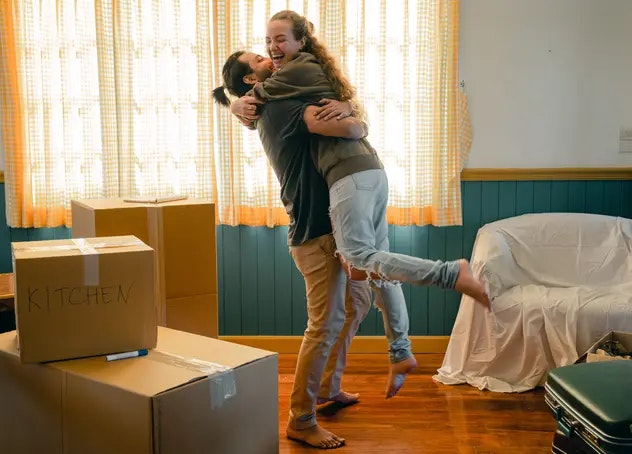Table of contents

The death of your partner is not only emotionally heavy, but also brings many financial questions. You may wonder who inherits the property, what happens with the mortgage, and if you can continue living in the house. In this article, we answer as many questions as possible.
Note: The information in this article provides general information, but it is impossible to discuss all scenarios and exceptions. Therefore, always contact a mortgage advisor to see what is possible in your specific situation.
Who inherits (your deceased partner’s share in) the house?
When your partner dies, the heirs inherit their assets and debts. Who is exactly designated as an heir is arranged in a will or by law. If there is a will, the distribution of the estate recorded in it applies. If there is no will, the estate is divided according to legal rules. Below you can read how this legal distribution works.
Married (or registered partnership) in community of property
Were you and your partner married or did you have a registered partnership? If that was in community of property, you inherit your partner’s share in the house. It does not matter who initially bought the house and when this was. All marriages entered into before 2018 were standard in community of property unless you deviated from this with prenuptial agreements.
Are there also children who are heirs? For their inheritance portion, they have a claim on you, as the surviving parent. They only receive their inheritance portion after you have died. The exact arrangement can vary depending on testamentary provisions and legal rules.
Married (or registered partnership) in limited community of property
Since 2018, all marriages are entered into ‘limited community of property’. All possessions and debts your partner acquired before marriage remain separate. All possessions and debts acquired during the marriage are shared.
If the house was thus purchased by your partner before the marriage, you do not automatically receive his or her share in the house. If the house was purchased by you both during the marriage, you do receive that share.
Married (or registered partnership) under prenuptial agreements
Did you establish special prenuptial agreements (or partnership agreements)? Then you have already thought about the distribution of your possessions and debts when you got married. Upon the death of a partner, these rules apply to the distribution of the estate. There is a good chance that you have also recorded with a notary what the consequences are for the mortgage.
Cohabiting, with or without a cohabitation contract
Did you live with your partner, but were not married and did not have a registered partnership? Then you are not automatically your partner’s heir unless it is recorded in a will. This does not immediately mean you cannot continue living in the house. If you have established a cohabitation contract with a notary and included a residence clause, you might be able to stay in the house.
A residence clause is a provision in the cohabitation contract that states what happens with the house if one of the partners dies. A residence clause in a cohabitation contract does not automatically imply that the surviving partner can continue living in the house. It depends on the specific conditions of the contract and the willingness of the heirs to accept this.

Was your partner the owner, or were you both owners?
You now know who the heirs are of your deceased partner. The question now is, who is registered as the owner of the house. Is it your deceased partner, or were you both?
Was your deceased partner the owner of the house?
If your deceased partner was the sole owner of the house, the heirs receive the full ownership of the house.
Are you an heir?
If you are the heir, you are responsible for paying the mortgage costs. If you can afford the mortgage costs on your own, you can ask the mortgage provider if you can transfer the mortgage to your name. If you cannot afford the costs alone, a payment from a survivor’s pension or a life insurance policy (if applicable) may alleviate the costs.
Read more here about inheriting a house
Are you not an heir?
Are you not an heir, but is there a residence clause in a cohabitation contract? Then you can probably (temporarily) stay in the house. What exactly happens depends on the provision and the willingness of the heirs.
If you are interested in taking over the house, you can discuss this with the heirs. They may choose to sell their ownership share to you. This does require that all heirs agree. Be well advised by the right professionals during this process.
Were you both owners of the house?
If you jointly bought the house, you are partly the owner of the house. Your partner's share goes to his or her heirs, as determined by the will or, in its absence, by the legal inheritance law.
Are you an heir?
If you are an heir, you get full ownership of the house, including the full mortgage costs. If you can afford the costs on your own, you can ask the mortgage provider to take over the mortgage. The bank then checks whether you can afford the costs on your own. For this, the bank needs a declaration of inheritance, which you can request from the notary.
If it's difficult to afford the costs alone, you may be able to pay (part of) the additional mortgage costs with a survivor’s pension, inheritance from your partner, or a payment from a life insurance policy. You may also be able to pay off the mortgage without penalty upon your partner's death. A mortgage advisor can look into this for you.
Are you not an heir?
If you are not an heir, you remain half owner of the house. The heirs of your deceased partner are co-owners for the other half. If a residence clause is laid down in a cohabitation contract, you may (depending on the conditions) stay in the house.
If not, you will need to negotiate with the heirs if you wish to continue living in the house. They may be able to sell their part of the house to you. It is advisable to seek advice from a notary, mortgage advisor, or legal advisor if you encounter this situation.
We help you quickly and easily find the right professionals for selling and buying a house. Find the best real estate agents at competitive rates, and schedule an appointment with a mortgage advisor.
- Receive proposals from multiple real estate agents
- Get upfront clarity on costs and methodology
- Choose based on performance and results
- Over 3000 people have gone before you
- Also schedule a free appointment with a mortgage advisor
- Free & without obligation
Receive several proposals from real estate agents in your inbox in the coming days!
- Safe
- Without obligation
- Free
- Independent
Do you have questions about our service? Contact us!
What are the options for paying the mortgage costs?
Are you struggling with paying the (extra) mortgage costs after your partner's death? You may be able to handle these costs yourself or pay them from a survivor's pension or an inheritance from your partner. Moreover, with many mortgage providers, it is possible to pay off without penalty when your partner dies. Contact your mortgage advisor to discuss the specific options.
Payout from a life insurance policy
Also find out if a life insurance policy (LIP) is linked to the mortgage. This is often the case, and because your partner has died during the term, you can receive a payout from this policy. You can use this amount to pay off part of the mortgage, ensuring your monthly costs do not suddenly become very high.
You are only entitled to the payout if you are listed as the beneficiary on the policy. When the policy is linked to the mortgage, the payout is automatically paid to the mortgage provider, who uses the amount to pay off (a portion of) the mortgage.
Is there no so-called ‘pledged policy’? Then it may sometimes also be possible to use the payout for other things. Contact your mortgage advisor to explore the possibilities. This all depends on the policy conditions, the mortgage, and tax rules.
Mortgage with NHG
If your partner dies and you have a mortgage with NHG, there are various possibilities to ease your situation. For example, any residual debt can be forgiven if you have to sell your house because you cannot afford the costs on your own. However, you must meet certain conditions.
Additionally, the Living Costs Facility allows you more time to find a solution for paying the costs. This helps you avoid being forced to sell your home. A mortgage advisor can also inform and advise you about this.
Selling the house
In some cases, unfortunately, you will have to sell the house because you cannot afford the costs alone. If you are your partner's sole heir, selling the house is easy to arrange. Visit the notary to have a declaration of inheritance registered with the Land Registry. After that, you can sell the house under your conditions.
If you only own half of the house, you must decide with the other owners (the heirs of your deceased partner) what will happen. To sell the house, you must all agree. You need a notarial deed from the notary in which all co-owners agree to the sale.
Once the house is sold, everyone receives a share of the sale proceeds equal to the ownership share. If you own half of the house, you receive half of the sale proceeds, after deducting any mortgage debts and costs.
You can repay the mortgage from the sale proceeds. Any surplus value can be used for buying another house. If you move to a cheaper house, you may keep some of the money.
Read here what you can do with the surplus value of your house
Discover more about selling a house
We help you quickly and easily find the right professionals for selling and buying a house. Find the best real estate agents at competitive rates, and schedule an appointment with a mortgage advisor.
- Receive proposals from multiple real estate agents
- Get upfront clarity on costs and methodology
- Choose based on performance and results
- Over 3000 people have gone before you
- Also schedule a free appointment with a mortgage advisor
- Free & without obligation
Receive several proposals from real estate agents in your inbox in the coming days!
- Safe
- Without obligation
- Free
- Independent
Do you have questions about our service? Contact us!
What happens to an interest-only mortgage after death?
As an heir, you take over (the portion of) the interest-only mortgage debt from your deceased partner. When the house is sold, this debt is paid off in one go, provided there is no residual debt. It is wise to seek advice from a mortgage advisor if you are dealing with an interest-only mortgage, so you make the right choices.
Can I continue living in the house?
In most cases, you can continue living in the house. With an interest-only mortgage, you make no monthly repayments, so the monthly costs remain affordable. Refinancing is not always necessary, especially if the mortgage is nearing its end. We repeat this, but again, it is wise to seek advice from a mortgage advisor.
Is it possible to repay an interest-only mortgage early?
Upon your partner's death, you can in most cases repay without penalty, provided you have sufficient savings. This allows you to reduce your mortgage debt and monthly interest costs.
Can you take an interest-only mortgage with you?
In principle, it is possible to take an interest-only mortgage to a new house, but you must meet the conditions set by the mortgage provider. For example, with most banks, the interest-only mortgage may not exceed 50% of the property's value. This percentage is lower than with an annuity or linear mortgage.
Furthermore, there are other conditions, ask your mortgage provider about them or schedule an appointment with a mortgage advisor.
Read more here about taking your mortgage with you
What happens to a family mortgage upon death?
A family mortgage, for example, one taken out with the parents of one of the partners, is considered part of the deceased partner's estate. If you are an heir, you also inherit the responsibility for repaying this loan.
What should you do if you are an heir of a family mortgage?
It is important to talk to the lenders. If they want the mortgage to be repaid, you may be able to take out a new loan (mortgage) for this purpose. In the 'worst' case, you can sell the house and repay them with the sale proceeds. Always check if arrangements have been made in a will or through a life insurance policy.
If no specific arrangements have been made, but you still want to stay in the house, discuss the possibilities with the lenders. Perhaps they will agree to a payment plan, allowing you to keep the monthly costs manageable.
The importance of a mortgage advisor
Always engage with a mortgage advisor when dealing with this issue. This professional advises you on the legal and financial implications of the family mortgage after your partner's death. You can discuss different scenarios, such as repaying the mortgage, adjusting the monthly costs, selling the house, or arranging a new loan to pay off the mortgage.
A mortgage advisor can also help you negotiate with the lenders about payment plans and other financial solutions to keep the costs manageable.














